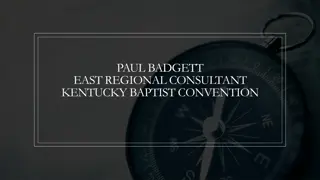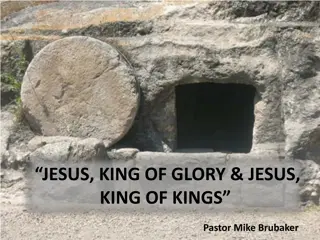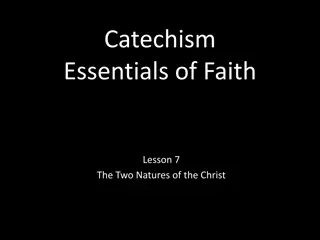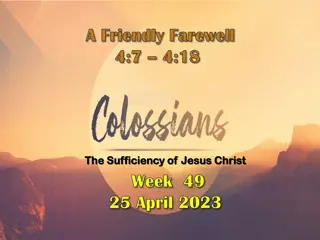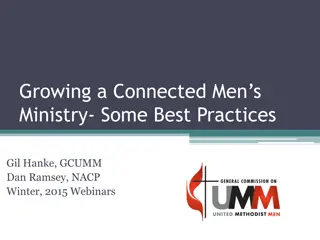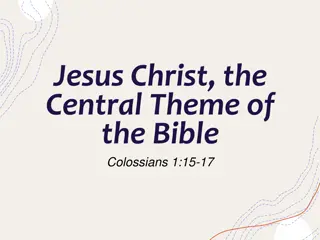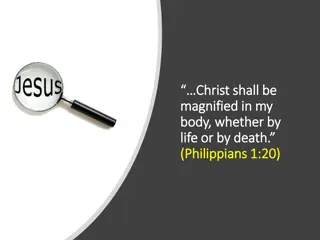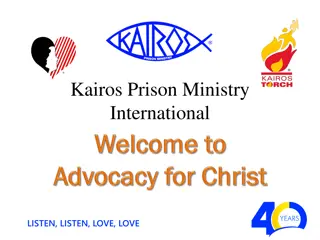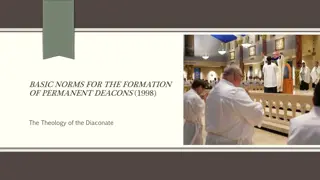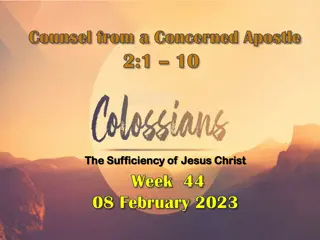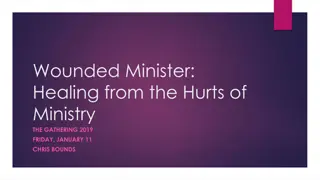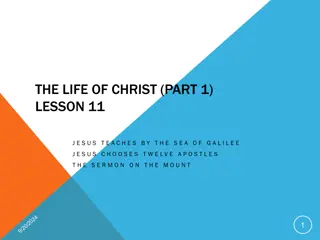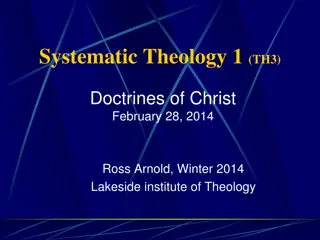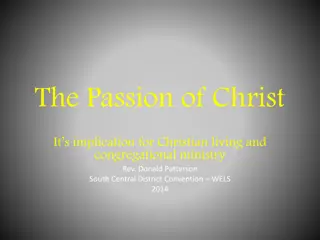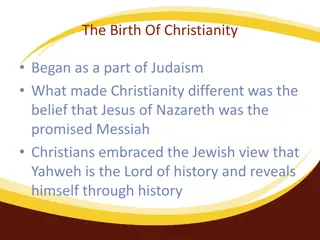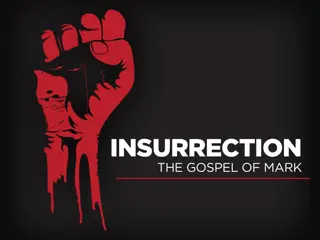
Early Church History and Importance of Gospel Texts
Explore the significance of Gospel texts from the New Testament, the role of Church Fathers, early controversies, and the impact of persecution on early Christianity. Learn about key figures like Dr. Ann T. Orlando, Matthew and John, Cyprian of Carthage, and Emperor Decius, as well as the development of literary forms like private and public letters. Discover how these historical events shaped the foundations of the Christian faith.
Download Presentation

Please find below an Image/Link to download the presentation.
The content on the website is provided AS IS for your information and personal use only. It may not be sold, licensed, or shared on other websites without obtaining consent from the author. If you encounter any issues during the download, it is possible that the publisher has removed the file from their server.
You are allowed to download the files provided on this website for personal or commercial use, subject to the condition that they are used lawfully. All files are the property of their respective owners.
The content on the website is provided AS IS for your information and personal use only. It may not be sold, licensed, or shared on other websites without obtaining consent from the author.
E N D
Presentation Transcript
Dr. Ann T. Orlando 22 Feb 2019 1
Key texts from New Testament: Matthew and John Cyprian of Carthage Early controversies Importance of See of Rome Assignments 2
Most Church Fathers placed greatest emphasis on Gospels of Matthew and John Both were understood as immediate followers of Jesus Luke and Mark were understood to be disciples of Paul and Peter, respectively Matthew and John were most often used liturgically More extensive commentaries on these two Gospels 3
2nd C evidence found in works already read in Patristics Ignatius of Antioch, letters to various cities Irenaeus, Prescription Against Heretics Importance of Rome 4
Private (grammaton/litterae) See Gregory Nazianzus Letter 51 To Nicoboulos Such letters should be brief, clear, and graceful Private-Public (epistole/epistula) Letter of instruction (I Clement) Scholarly treatise (Origen On Prayer) Letter from heaven (Book of Revelation) Official Synodal letters Festal letters Papal decree (usually a respondum) 5
First Empire-wide persecutions promulgated by Emperor Decius, 250 Political instability within Empire Increased threats from Persia and Northern barbarians Required that everyone offer sacrifice for the Empire; Required that everyone show their libellus (little book) or certificate to prove that they offered sacrifice Required that Christians hand over their sacred books to be burned Anyone who did not comply was condemned to death as a traitor 6
Teacher of Rhetoric before his conversion c. 248 Almost immediately, he was elected bishop of Carthage Tertullian was a major influence on him During Decian persecutions, he fled Carthage, but remained in contact with the Church there Martyred in persecutions of Valerian, 257 (as was Novation) St. Cyprian will be a major influence on the greatest of Western theologians: Augustine 7
De Lapsi (Concerning the Lapsed) Written 251 Supported Cornelius (over Novation) as Bishop of Rome Specified types of lapsed and length of repentance required for each. Example: those who lapsed under torture had least time of repentance De catholicae ecclesiai unitate (On the Unity of the Catholic Church) Written in 251 in support of Cornelius Key is Chapter 4 on primacy of Peter, although there are 2 versions of this chapter Letters 81 survive from third century 8
Roman priest, opposed election of Pope Cornelius in 251 Thought Cornelius too lax in re-admitting lapsed (lapsi) Christians back into Church Set himself up as a rival Pope, drawing support from around Empire, especially from Montanists Driving force opposing Novation: St. Cyprian, Bishop of Carthage 9
Started by Montus and two female disciples: Prisca and Maximillia Originated in Phrygia in Asia Minor c. 160 Quickly spread around Mediterranean, took strong root in North Africa Seems to have died out or morphed into other movements (Donatism) by mid-Third Century in North Africa Tertullian s later works may be the only Montanists documents extant (On Flight, On Modesty, Against Praxeas) Tertullian, North African Christianity 10
Believed in continuing Prophecy in Church through the action of Holy Spirit Prophecy took the form of ecstatic utterances and actions; equal in value to Scripture Encouraged excessive disciplinary practices Opposed remarriage after death of spouse Encouraged active seeking of martyrdom Once a person was Baptized, and then sinned, they could not be forgiven Tertullian, North African Christianity 11
Some question as to whether or not to accept the New Prophecy Admiration for spirituality Respect and honor for martyrs But New Prophecy seemed at odds with the importance of Apostolic Succession as guarantor of Truth Excessive disciplinary practices, including no forgiveness of sins was not accepted by bishops Condemned by Pope Eleutherius c. 180 Tertullian, North African Christianity 12
As noted above, Cyprian accepted lapsed into the Church with appropriate penance However, he did not recognize the validity of Baptism by heretics or schismatics This put him in conflict with Pope Stephen; the Roman Church seems to have always recognized Baptism by anyone as long as water and the Trinitarian formula were used Cyprian thought the orthodoxy and validity of the minister was important in administering the sacrament Note, Cyprian also opposed the forgiveness of sins by martyrs (libelli martyrum) for the same reason: the validity of the minister Cyprian, and many others, wanted Christians baptized by heretics to be re-Baptized (see Letter 74 Against Stephen) Pope St. Stephen prevailed 13
Letter 3 Emphasis on deacons as subservient to bishops Argument in part based on selection of apostles (and therefore subsequent bishops) by Christ But Apostles (bishops) chose deacons Bishop can depose or excommunicate an unruly deacon 14
Cyprian What (who) is the source of disunity in the Church? Who calling themselves Christians is Cyprian writing against? What is role of bishops in preserving unity? How is episcopacy related to apostles and Peter? What are some of the images Cyprian uses for the Church? How does he interpret where two or three are gathered in my name ? What does Cyprian say about confessors (martyrs) and their role in the Church? Cyprian Letter 3 What is the occasion of the letter? What Old Testament examples does Cyprian give for authority of bishops? Who makes bishops? Who deacons? Cyprian Letter 63 What is the occasion of the letter? How is the sacrifice at the altar to be conducted? What is the role of the bishop? Can he make changes? Cyprian On the Unity of the Church On the Unity of the Church Cyprian Letter 3 Cyprian Letter 63 15
Letter 53, written 398 Type of synodal letter from multiple bishops in North Africa Written to instruct a Donatist priest and encourage unity with Catholic Church Peter as first in order of bishops Gives line of succession to his present day Importance of Scripture 16
Augustine Letter 53 1 How does the letter describe the universality of the Church? 2 How does Peter represent this? 3 Why is the apostolic succession of bishops so important? 4 What does this letter say about Scripture? Augustine Letter 53 17
Commentary on Johns Gospel Book I gives an introduction Begins with who alone (Christ) is a priest according to Melchizedek, and who according to Aaron What is a gospel Importance of John s Gospel 18
Origen, Commentary on John 1 How does Origen understand 144,000? 2 What distinction does Origen draw between laity and priests ;see (10)? 3 What distinction between order of Aaron and Melchizedek? 4 What does Origen have to say about Scripture? Origen, Commentary on Matthew 1 How does Origen understand Rock in Mt 16:18? 2 Who is every Peter? Origen, Commentary on John Origen, Commentary on Matthew 19
Cyprian of Carthage, Letter 63: To Cecil _____On the Unity of the Catholic Church, available at https://www.ewtn.com/library/sources/unity.txt _____ Letter 3: To Rogatian on Deacons Augustine, Letter 53 Origen, Commentary on John s Gospel, I.1-14 Commentary on Matthew s Gospel, XII.14 Prepare Paper #5 20



